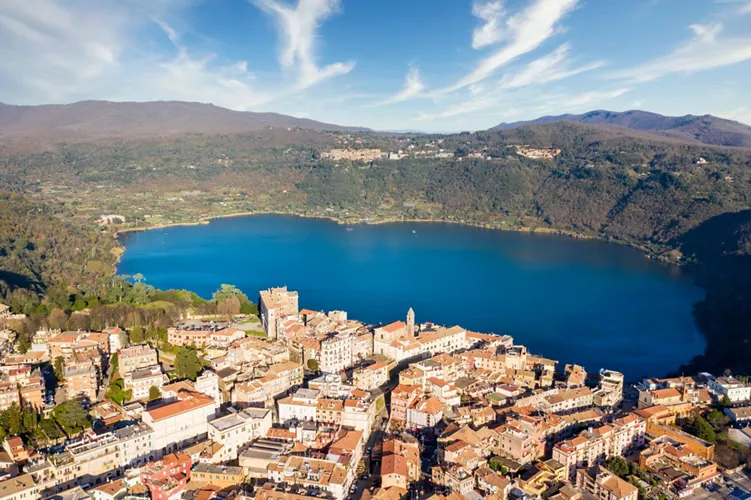This content was automatically translated. View the original text.

The town of Genzano lies on the crater of Lake Nemi, on the Appian Way, in the dense woods of the Castelli Romani area.
It is the city of the Infiorata, a large carpet of fresh flowers for the religious festival of Corpus Christi, but also of delicious PGI bread and strawberries.
A favourite destination for many Roman out-of-town trips, a charming and scenic place to relax amidst greenery and history.
What to see in Genzano
A walk through the village of Genzano is a continuous discovery of panoramic views of Lake Nemi and the countryside sloping into the crater.
In the historical centre, the bulk of the 18th century Palazzo Cesarini Sforza, the barons of Genzano, stands out. On display on the piano nobile, the Hager-Sportelli collection, a hundred or so works of art from the 17th and 18th centuries that belonged to Hellmut Hager, one of the greatest scholars of Baroque architects Carlo Fontana, Gian Lorenzo Bernini and Filippo Juvarra.
On the mezzanine floor, the permanent exhibition Symposium, at the table between myth and culture displays artefacts related to wine culture with a nucleus of works recovered by the Guardia di Finanza as part of operations to combat illegal trafficking in antique works.
There is also a section in the palace dedicated to archaeological finds from the Antonine villa (1st century AD) where two Roman emperors, Antoninus Pius and Commodus, were born. The exhibition is the result of an ongoing excavation campaign carried out in cooperation with an American university.
Also worth a visit is the church of Santa Maria della Cima, with its monastery, the remains of the medieval walls and the Infiorata museum, which recounts the most deeply rooted tradition in Genzano, between history and collective memory.
The Infiorata of Genzano, Heritage of Italy
Every year, for the feast of Corpus Christi (the second Sunday after Pentecost, usually in June), the centre of Genzano is covered with a 2,000-square-metre carpet of fresh flower petals divided into 14 squares made up of more than 400,000 carnations of every colour.
The Infiorata di Genzano, recognised by the Ministry of Tourism as 'Heritage of Italy' is one of the most spectacular events of its kind, renewed annually since 1778.
A festival that is not just tourist marketing, but a sense of belonging and identity for the locals.
Moreover, its preparation lasts a whole year: during the winter, sketches are designed and prepared. In April, how many and which flowers will be needed is estimated. In May the work site is set up and in June, on the Thursday before Corpus Christi Sunday, the stripping activity (separating the petals from the corollas) begins. The petals are divided by colour and kept in cool caves under the town hall.
In addition to carnation petals, the following: broom, sausa, fennel, pine seed, chrysanthemum, pine bark, vine black, maize, rice, sage, chilli, wheat, soya, pine nut husks, oregano, coffee black, bran are also used.
The laying of the petals and creation of the floral images takes place between Saturday evening and Sunday morning. In the following months, an inventory is made of the materials that can be stored and preparations are made for the next edition. The highlight of the festival is on Sunday afternoon with the procession on the Via Infiorata and continues on Monday with processions and bands until the village children come running down the steps of the church of Santa Maria degli Angeli and finally unravel the flower paintings.
What to eat in Genzano: PGI homemade bread
The local gastronomic speciality is Pane casereccio di Genzano, the first in Italy to be awarded the PGI mark made from wheat flour, water, natural yeast and salt.
The dough is left to rise for about an hour: cut into rolls and loaves, it rests in wooden boxes with hemp cloths and is dusted with bran, then baked in a wood-fired or electric oven.
The crust is crispy, the inside is soft and spongy: thanks to the natural yeast, so-called mother yeast or sourdough, it keeps for days. The bakers of Genzano are united in a consortium that monitors compliance with production specifications and ensures survival of the wood-fired ovens. The bread is sold in loaves of 0.5 to 2.5 kg.
00045 Genzano di Roma RM, Italia